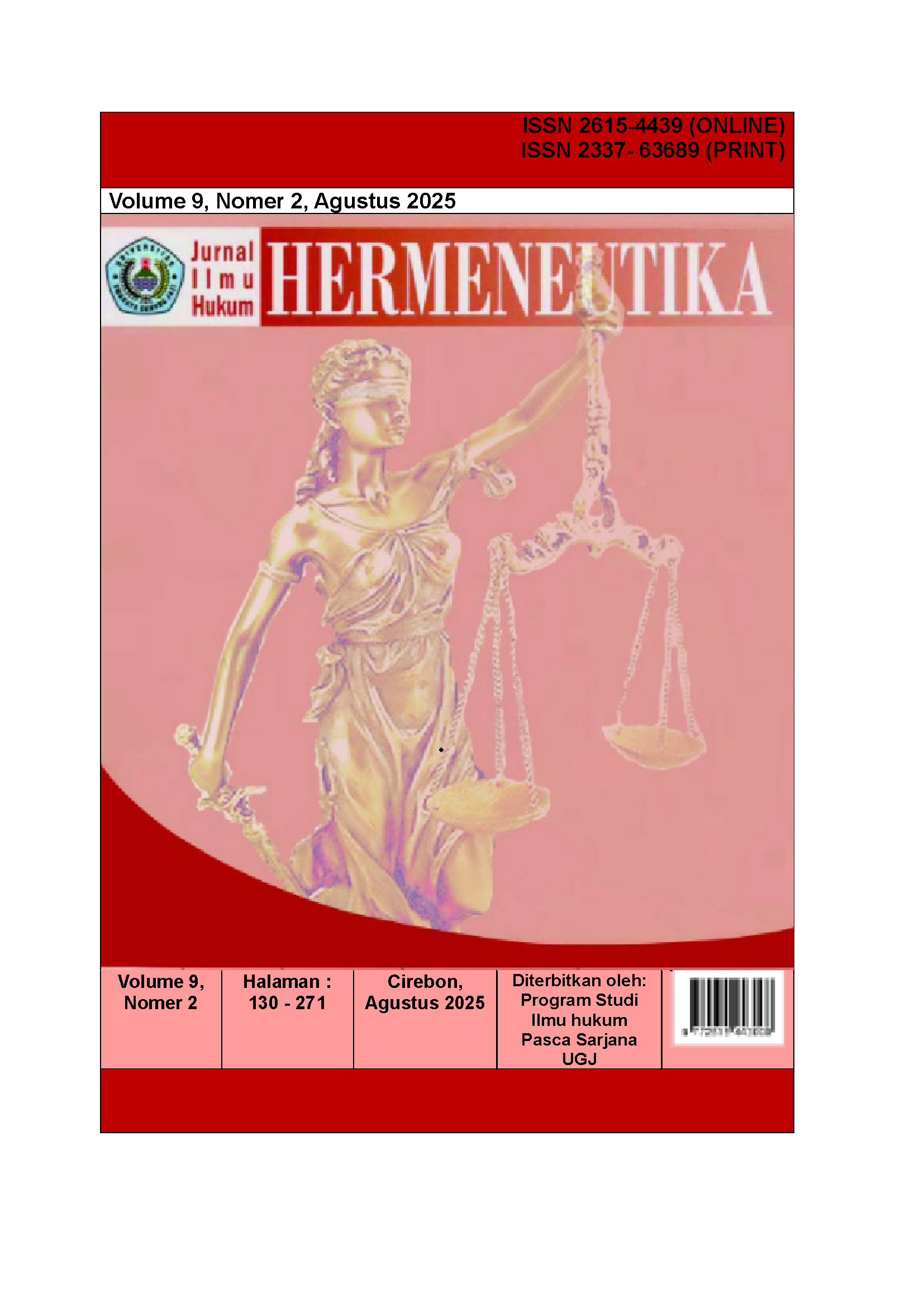REGIONAL GOVERNMENT POLICY IN IMPROVING WELFARE HONORARY TEACHER IN INDRAMAYU
DOI:
https://doi.org/10.33603/hermeneutika.v9i2.10789Keywords:
Policy, Honorary Teachers, WelfareAbstract
This research examines the policies of the Regional Government of Indramayu Regency aimed at improving the welfare of honorary teachers. Formulation of the problem in this research: (1) How are honorary teachers arranged in Indramayu district? (2) What is the Indramayu government's policy in improving the welfare of honorary teachers? This research employs a Positivist or Doctrinal legal paradigm, utilizing normative research methods. Data was obtained through a literature study by examining statutory regulations, such as Law Number 14 of 2005 concerning Teachers and Lecturers, as well as regional policies relating to honorary teachers. The research results show that the regulation of honorary teachers in Indramayu Regency is based on national policies which emphasize protection, recognition and improving the welfare of teaching staff. Additionally, the Indramayu Regency Government has implemented a policy utilizing School Operational Assistance Funds (BOS) in accordance with Minister of Education and Culture Regulation Number 6 of 2021. BOS funds can be used to pay honorary salaries for honorary teachers with a maximum allocation of 50% of the total funds, as a step to improve their welfare. However, in reality, it has not been possible to improve the welfare of honorary teachers evenly.
References
Artadi, I., Sudarminto, S., & Partinah, W. (2018). Legal Study of Delays in Registration of Fiduciary Guarantees. HERMENEUTICS: Journal of Legal Studies, 2(2).
Cahyati, E., Miranda, D., Windasari, W., & Cindy, A. H. (2024). Effective Management of Educators and Education Personnel to Create Quality Learning. TSAQOFAH, 4(3), 1510-1521.
Diskominfo Indramayu, indramayu go.id "fight for 1,899 Passing Grade Teachers to be appointed by PPPK, Regent Nina Agustina will send letters to 4 ministries", 1 December 2022, accessed 29 January 2025.
Faizah, S. N. (2017). The fact of learning and learning. At-Thullab: Journal of Madrasah Ibtidaiyah Teacher Education, 1(2), 175-185.
Fajar, M., & Achmad, Y. (2017). Dualism of Normative and Empirical Legal Research, Print IV. Yogyakarta: Student Library.
Hikmah, S. N. A. (2022). Problems of Quality and Competency of Indonesian Language Teachers. EXPLORER Journal: Studies in Indonesian Language and Literature Education, 2(2), 154-168.
Moleong, L. J. (2016). Qualitative research methodology (revised ed.).
Raitio, J. (2013). The principle of legal certainty in EC law (Vol. 64). Springer Science & Business Media.
Romdin, R. R. (2020). Subjective Welfare of State Elementary School Honorary Teachers in Cluster 02, Tiga Raksa District (Master's thesis, Jakarta: FITK UIN Syarif Hidayatullah Jakarta).
Sanusi, S., & Utomo, H. (2020). Law Enforcement Against the Non-Neutrality of State Civil Apparatus in the 201 Cirebon Mayor and Deputy Mayor Election8. HERMENEUTICS: Journal of Legal Studies, 4(1).
Sindo, K. (2019). Thursday 05 December 2019-07.10 WIB Poor Survey, Indonesian Education System Needs a Breakthrough. Accessed from https://edukasi.sindonews.com/berita/1465474/144/survei-jeblok-sistem-pendidikan-indonesia-butuhkan-terobosan. ACCESSED on June 01, 2024.
Sulindawati, N. L. G. E. (2018). Analysis of elements of past education as a basis for determining the direction of learning policies in the era of globalization. Social Sciences Scientific Journal, 4(1), 51-60
Sunaryo, T. O. P., Fautanu, I., & Suganda, A. (2024). Legal Certainty Advocate Organizational System Arrangements in the Implementation of Professional Quality with the Value of Justice. Journal of Social and Environmental Management, 18(2), e5762-e5762.
Sutrisno, E., & Permana, D. Y. (20220). Implementation of legal protection for workers in Indonesia in fixed-term work agreements and indefinite-term work agreements according to Law no. 11 of 2020 concerning Job Creation.
Tahir, A. (2014). Public policy and transparency in regional government administration. Bandung: Alphabet.
Wartoyo, F. (2023). Legal Protection And Welfare In Education: A Post-Pandemic Recovery Perspective On Implementing Law NO. 14 OF 2005. Journal of Legal Reform, 10(3), 541-551.
Legislation
Law Number 14 of 2005 concerning Teachers and Lecturers.
Minister of Education and Culture Regulation Number 6 of 2021, distribution of BOS Funds with Law Number 20 of 2003 Article 8
Indramayu Regent Regulation No. 39 of 2021 concerning Technical Instructions (Juknis) for the Distribution of Welfare for Non-PNS Teachers and Non-PNS School Administrative Staff at the Early Childhood and Basic Education Levels.
Indramayu Regent Regulation Number 11 of 2023 concerning Technical Instructions for Distribution of Welfare for Non-Civil Servant Teachers and Non-Civil Servant School Administrative Staff at the Early Childhood and Basic Education Levels
Indramayu Regent's Regulation Number 40 of 2023 concerning Guidelines for Providing Welfare for Non-Civil Servant Teachers and Non-Civil Servant School Administrative Personnel at the Early Childhood and Basic Education Levels within the Indramayu Regency Government.
Downloads
Published
Issue
Section
Citation Check
License
Copyright (c) 2025 Yahya Zuliati, Sanusi Sanusi, Sigit Gunawan

This work is licensed under a Creative Commons Attribution-ShareAlike 4.0 International License.
The Authors submitting a manuscript do so on the understanding that if accepted for publication, copyright of the article shall be assigned to Jurnal HERMENUTIKA, Sekolah Pascasarjana Ilmu Hukum. Universitas Swadaya Gunung Jati as publisher of the journal. Copyright encompasses rights to reproduce and deliver the article in all form and media, including reprints, photographs, microfilms, and any other similar reproductions, as well as translations.
Jurnal HERMENEUTIKA, Universitas Swadaya Gunung Jati and the Editors make every effort to ensure that no wrong or misleading data, opinions or statements be published in the journal. In any way, the contents of the articles and advertisements published in Jurnal HERMENEUTIKA are the sole responsibility of their respective authors and advertisers.










